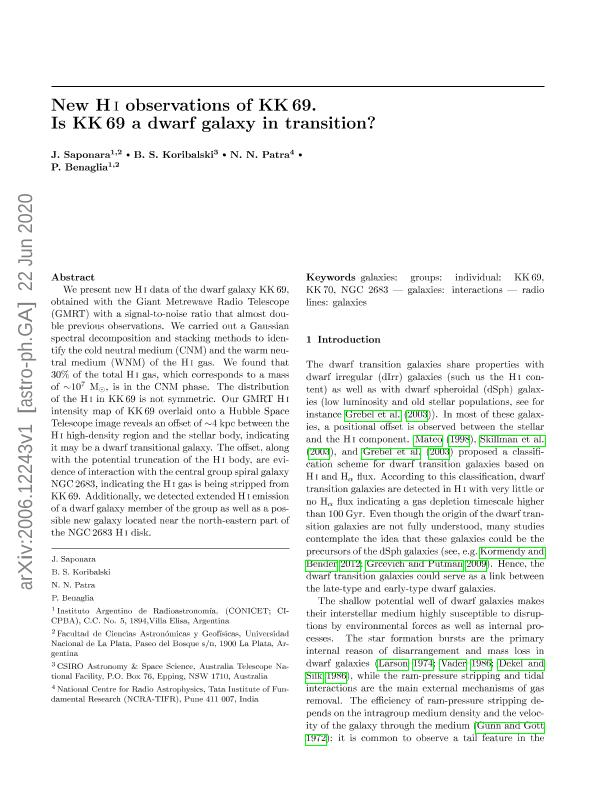Mostrar el registro sencillo del ítem
dc.contributor.author
Saponara, Juliana

dc.contributor.author
Koribalski, Bärbel

dc.contributor.author
Patra, N. N.
dc.contributor.author
Benaglia, Paula

dc.date.available
2020-12-30T12:29:20Z
dc.date.issued
2020-07
dc.identifier.citation
Saponara, Juliana; Koribalski, Bärbel; Patra, N. N.; Benaglia, Paula; New H i observations of KK 69. Is KK 69 a dwarf galaxy in transition?; Springer; Astrophysics And Space Science; 365; 111; 7-2020; 1-13
dc.identifier.issn
0004-640X
dc.identifier.uri
http://hdl.handle.net/11336/121343
dc.description.abstract
We present new HI data of the dwarf galaxy KK 69, obtained with the Giant Metrewave Radio Telescope (GMRT) with a signal-to-noise ratio almost double previous observations. We carried out a Gaussian spectral decomposition and stacking methods to identify the cold neutral medium (CNM) and the warm neutral medium (WNM) of the HI gas. We found that 30% of the total HI gas, which corresponds to a mass of ∼107 M☉, is in the CNM phase. The distribution of the HI in KK 69 is not symmetric. Our GMRT HI intensity map of KK 69 overlaid onto a Hubble Space Telescope image reveals an offset of ∼4 kpc between the HI high-density region and the stellar body, indicating it may be a dwarf transitional galaxy. The offset, along with the potential truncation of the HI body, are evidence of interaction with the central group spiral galaxy NGC 2683, indicating the HI gas is being stripped from KK 69. Additionally, we detected extended HI emission of a dwarf galaxy member of the group as well as a possible new galaxy located near the north-eastern part of the NGC 2683 HI disk.
dc.format
application/pdf
dc.language.iso
eng
dc.publisher
Springer

dc.rights
info:eu-repo/semantics/openAccess
dc.rights.uri
https://creativecommons.org/licenses/by-nc-sa/2.5/ar/
dc.subject
Radio lines: galaxies
dc.subject
Galaxies: interactions
dc.subject.classification
Astronomía

dc.subject.classification
Ciencias Físicas

dc.subject.classification
CIENCIAS NATURALES Y EXACTAS

dc.title
New H i observations of KK 69. Is KK 69 a dwarf galaxy in transition?
dc.type
info:eu-repo/semantics/article
dc.type
info:ar-repo/semantics/artículo
dc.type
info:eu-repo/semantics/publishedVersion
dc.date.updated
2020-12-04T18:35:17Z
dc.journal.volume
365
dc.journal.number
111
dc.journal.pagination
1-13
dc.journal.pais
Alemania

dc.journal.ciudad
Berlin
dc.description.fil
Fil: Saponara, Juliana. Provincia de Buenos Aires. Gobernación. Comisión de Investigaciones Científicas. Instituto Argentino de Radioastronomía. Consejo Nacional de Investigaciones Científicas y Técnicas. Centro Científico Tecnológico Conicet - La Plata. Instituto Argentino de Radioastronomía; Argentina
dc.description.fil
Fil: Koribalski, Bärbel. Australia Telescope National Facility; Australia
dc.description.fil
Fil: Patra, N. N.. National Centre For Radio Astrophysics; India
dc.description.fil
Fil: Benaglia, Paula. Provincia de Buenos Aires. Gobernación. Comisión de Investigaciones Científicas. Instituto Argentino de Radioastronomía. Consejo Nacional de Investigaciones Científicas y Técnicas. Centro Científico Tecnológico Conicet - La Plata. Instituto Argentino de Radioastronomía; Argentina
dc.journal.title
Astrophysics And Space Science

dc.relation.alternativeid
info:eu-repo/semantics/altIdentifier/url/http://link.springer.com/10.1007/s10509-020-03825-2
dc.relation.alternativeid
info:eu-repo/semantics/altIdentifier/doi/http://dx.doi.org/10.1007/s10509-020-03825-2
Archivos asociados
